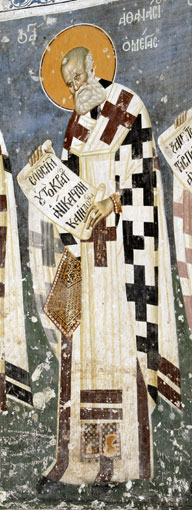Saint Athanasius the Great
(
31.01.2009
)
Chapter 1
The Genealogy of Jesus Christ the Saviour.
Jesus Christ is a Priest and a King.
He is a Priest, because he sacrificed Himself because of us.
He is a King because he reigned to defeat the sin and death.
Fourteen degree kinship. Why it was said they were fourteen? I think because the Evangelist understood the Babylonian movement itself under the term of one kinship, and Jesus Himself, under the second one.
Chapter 2
Because, we saw His Star on the East.
If one star in the sky would exist for every man, then why the sky has become full of stars at the third day, but Adam was created in the sixth day?
And, it is very clear from the following that the destiny, birth and stars never govern the deeds of people: If everything was depending of the mentioned above but not of man’s free will, why then you punish your servant who steals, and why do you judge the adulterer woman? Why do you feel embarrassment when you do something bad? Why can’t you accept a word that reprimands you? If someone calls you adulterer, rake, drunkard or something similar, why then you take this as an insult? If your free will is not there to make sins, then there is no any sin in what you have done, nor there is any insult in what you have said. But then, because you do not forgive the one who sinned, and you yourself are embarrassed doing something bad, you’re embarrassed and try to hide such act, and for the one who blames you for that you say he’s insulting you, you admit by this that our deeds are not connected to any necessity, but are characterised by freedom of will. We may forgive to those who are tied to necessity. If someone who might be a possessed by a demon tears our clothing or kick us, we do not punish or blame him, but we take pity of him and forgive him instead. Why it is so? Because the poor one didn’t do such act with his free will, but because he was forced by the evil soul. Therefore, if any other sins became due necessity and unavoidable destiny, then we would forgive them. However, because we know it was not a necessity we do not forgive – neither masters to servants, nor men to women, nor fathers to children or chiefs to officers but in opposite we become strict tormentors and punishers of impudence, we resort to courts, the sinners are penalised to spanking, we reprimand them and undertake every measure to prevent them from the evil.
